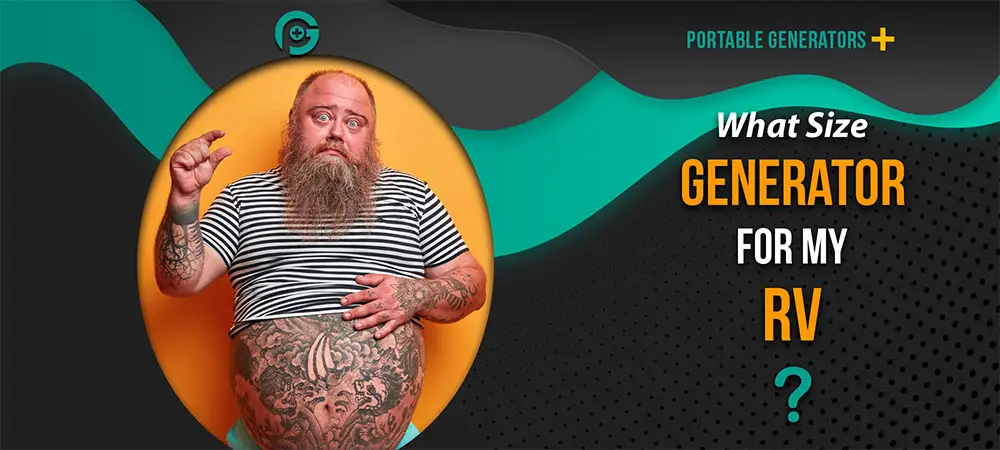What Size Generator For RV? - Quick Answer...
Select which class your RV falls under on the chart below and choose your generator size accordingly.
- Class B Van with one AC unit: 2,000 to 3,600 watts
- Class C RV with one AC unit: 2,800 to 4,000 watts
- Class A RV with two AC units (15,000 BTU each): 5,500 to 8,000 watts
- Class A RV with three AC units (15,000 BTU each): 10,000 to 12,500 watts
- Fifth wheel with two AC units: 5,500 to 7,000 watts
Introduction
Question: What Size Generator For RV?
Are you an avid camper or road trip enthusiast eagerly exploring the great outdoors with your beloved RV? If so, you know the importance of having a reliable source of power while on the go. But with a multitude of generator options available, it can be quite a challenge to determine the perfect fit for your RV.
Fear not, for we are here to shed some light on this crucial decision. In this article, we will guide you through the process of finding the ideal size generator for your RV, ensuring that you can enjoy all the comforts of home while on your exciting adventures.
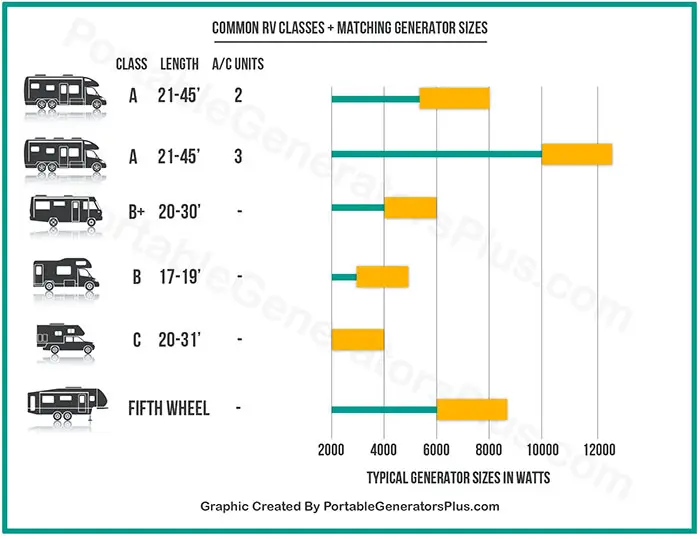
NOTE: We know the way the question “What Size Generator For RV?” is really poorly written, but it is the way the question is searched for. To show up as an answer in the SERP’s we have to quote the question as asked. Cheers.
1. Power Requirements of an RV
When it comes to RVs, having a reliable power source is essential for a comfortable and convenient experience on the road. RV owners rely on various appliances and systems to make their trips enjoyable, and understanding the power requirements of these devices is crucial in choosing the right generator.
Appliances and Systems in an RV
Before diving into generator sizes, it’s important to have a clear understanding of the appliances and systems commonly found in an RV. Most RVs come equipped with a range of electrical appliances, including air conditioners, refrigerators, microwaves, water pumps, televisions, and lighting systems.
Some RVs also have additional features like electric heaters, washer/dryer combos, and entertainment systems. Each of these appliances has a specific power consumption that needs to be taken into account when selecting a generator.
Power Consumption of RV Appliances
RV appliances, particularly those that run on electricity, consume varying amounts of power. To determine the power consumption of an appliance, you need to look for the wattage rating, which is usually indicated on the device or in the user manual.
For example, a standard RV air conditioner may consume around 1,500 to 3,500 watts, while a refrigerator typically consumes around 600 to 800 watts.
It’s important to note that some appliances also have a surge wattage requirement, which is the initial power surge they need to start up. This surge wattage is higher than the continuous wattage and needs to be considered when choosing a generator. With an understanding of the power requirements of your appliances, you can now move on to the considerations for choosing a generator.
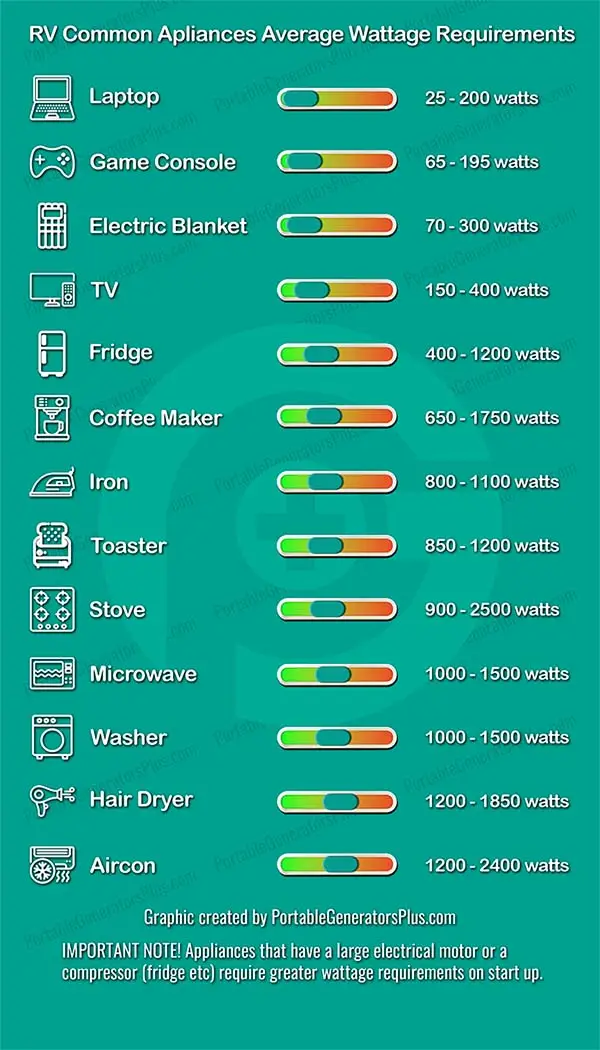
2. Factors to Consider When Choosing a Generator
Selecting the right generator for your RV involves considering several important factors. Here are the key elements to keep in mind:
Power Output
The power output of a generator is measured in watts and indicates how much electrical power it can provide. It’s crucial to choose a generator that can meet the power requirements of your RV appliances.
To determine the power output you need, you’ll have to calculate the total wattage requirement, which we’ll discuss in more detail later.
Fuel Type
Generators can be powered by different fuel types, including gasoline, diesel, propane, or even solar energy. Each fuel option has its own advantages and considerations. Gasoline-powered generators are commonly available and more affordable, but they require regular refueling.
Diesel generators are fuel-efficient and offer longer run times but are generally more expensive. Propane generators are quieter and cleaner-burning, but propane may be less readily available in some areas. Consider your fuel preferences and availability when choosing a generator.
Noise Level
Another crucial factor to consider is the noise level of the generator. RV camping often involves staying in campgrounds or RV parks where noise restrictions may be in place. It’s important to choose a generator that operates at a noise level that won’t disturb you or your fellow campers. Look for generators labeled as quiet or low-decibel models for a more peaceful camping experience.
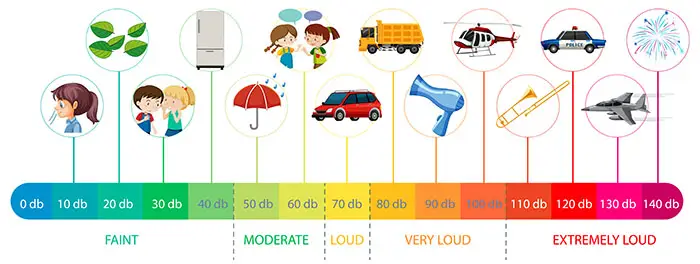
Portability
Portability is a significant consideration, especially if you plan on moving your RV frequently. Generators come in various sizes and weights, and it’s important to choose a generator that is lightweight and compact enough to fit your RV storage space and easy to transport when needed. Consider the size and weight of the generator to ensure it aligns with your mobility needs.
Budget
Your budget is another critical factor when choosing a generator for your RV. Generators come at different price points depending on their power output, fuel type, and additional features. It’s essential to set a budget and find a generator that offers the best combination of features and performance within your price range.
3. Determining the Generator Size You Need
Determining the right generator size for your RV involves calculating the minimum wattage requirement, surge wattage requirement, and total wattage requirement.
Minimum Wattage Requirement
The minimum wattage requirement refers to the amount of power needed to run essential appliances and systems in your RV. These typically include items like lighting, water pumps, and basic electronic devices.
To calculate the minimum wattage requirement, add up the wattage ratings of all your essential appliances and systems.
Surge Wattage Requirement
In addition to the continuous power consumption, some appliances require a higher wattage during startup. This surge wattage requirement accounts for the initial power surge needed to get the appliance running.
Appliances like air conditioners, refrigerators, and microwaves often have a surge wattage requirement. Make sure to consider the highest surge wattage rating among your appliances when calculating the generator size you need.
Calculating Total Wattage Requirement
To determine the total wattage requirement, simply add up the minimum wattage requirement and the highest surge wattage requirement. This total wattage requirement will give you an idea of the size and power output your generator needs to meet.
It’s always recommended to choose a generator with a slightly higher power output than your total wattage requirement to ensure a reliable power supply.

NOTE: We know the way the question “What Size Generator For RV?” is really poorly written, but it is the way the question is searched for. To show up as an answer in the SERP’s we have to quote the question as asked. Cheers.
4. Common Generator Sizes for RVs
Now that we have a clear understanding of the power requirements and calculations let’s explore the common generator sizes suitable for RVs.
2,000-Watt Generator
A 2,000-watt generator is a popular choice for small to medium-sized RVs. It can provide sufficient power for essential appliances and systems, including lighting, water pumps, and small electronics. However, it may not be able to handle high-end appliances like air conditioners or large refrigerators.
3,000-Watt Generator
A 3,000-watt generator offers a bit more power and can handle larger RVs with additional appliances like air conditioners, refrigerators, and microwaves. It can also accommodate electronic devices and entertainment systems. This size is suitable for most standard RVs.
4,000-Watt Generator
A 4,000-watt generator is a step up in power output and can handle larger RVs or those with more power-hungry appliances. It can comfortably run multiple appliances simultaneously, including air conditioners, refrigerators, microwaves, and other essential systems. If you have a larger RV or intend to run multiple high-demand appliances, a 4,000-watt generator may be your best choice.
5,000-Watt Generator
A 5,000-watt generator provides even more power and is suitable for larger RVs or those with extensive power needs. This size can handle multiple high-demand appliances simultaneously, including air conditioners, large refrigerators, microwaves, and entertainment systems. If you have a Class A motorhome or require a significant power supply, a 5,000-watt generator is a solid option.
6,000-Watt Generator
A 6,000-watt generator is the largest size typically used for RVs. It is suitable for larger, high-end RVs with extensive power requirements. This generator size offers more than enough power to run multiple high-demand appliances and systems simultaneously, including multiple air conditioners. If you have a large, luxurious RV and require a robust power supply, a 6,000-watt generator is the way to go.
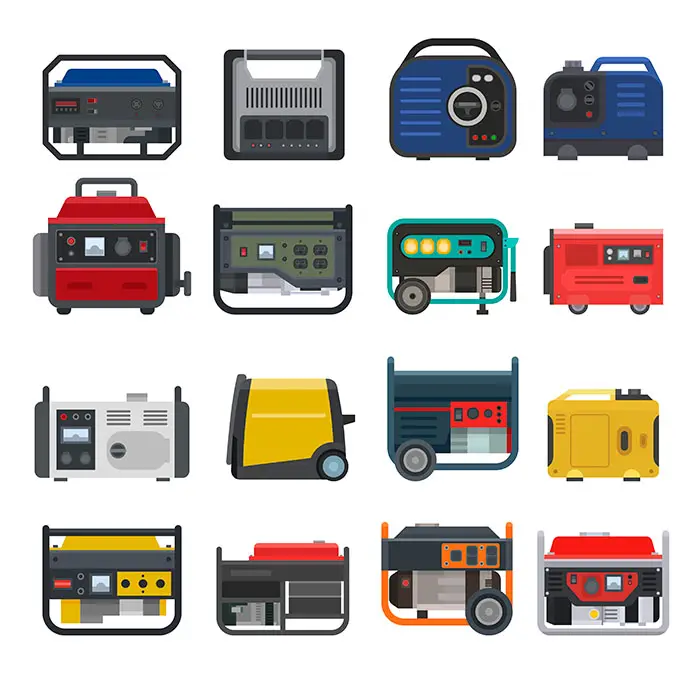
5. Matching Generator Size to RV Type
The size of your RV can also influence the choice of generator size. Here’s a breakdown of common RV types and their corresponding generator sizes:
Class A: Motorhomes
Class A motorhomes are the largest and most luxurious RVs. They often come equipped with multiple air conditioners, large refrigerators, and numerous electronic devices. For Class A motorhomes, a generator size of at least 5,000 watts is recommended to accommodate the extensive power needs of these vehicles.
Class B and B+: Larger Campervans
Class B motorhomes, also known as camper vans, are smaller in size but still offer comfortable amenities. They typically have a smaller power consumption compared to larger RVs. A generator size of 2,000 to 3,000 watts should suffice for most Class B motorhomes.
Class C: Campervans
Class C motorhomes are a popular choice for families and offer a good balance between size and features. They often have multiple appliances and systems, including air conditioners and larger refrigerators. A generator size of 3,000 to 4,000 watts is typically suitable for Class C motorhomes.
Travel Trailers
Travel trailers come in various sizes and configurations. The generator size needed for a travel trailer depends on its length, the number of appliances, and power requirements. Generally, a generator size of 2,000 to 4,000 watts should cover the power needs of most travel trailers.
6. Other Considerations
Aside from the main factors discussed earlier, there are a few additional considerations to keep in mind when choosing a generator for your RV.
Generator Noise and Campground Restrictions
As mentioned earlier, noise levels can be a concern when using a generator in campgrounds or RV parks. Some locations have noise restrictions, especially during quiet hours. It’s important to choose a quiet generator or consider alternative options like inverter generators, which are known for their reduced noise levels.
Dual vs. Single Generator Setups
If you have extensive power requirements or prefer a backup power source, you might consider a dual generator setup. Dual setups involve running two generators in parallel to increase power output. This setup can provide more power and redundancy, ensuring you have a backup in case one generator fails.
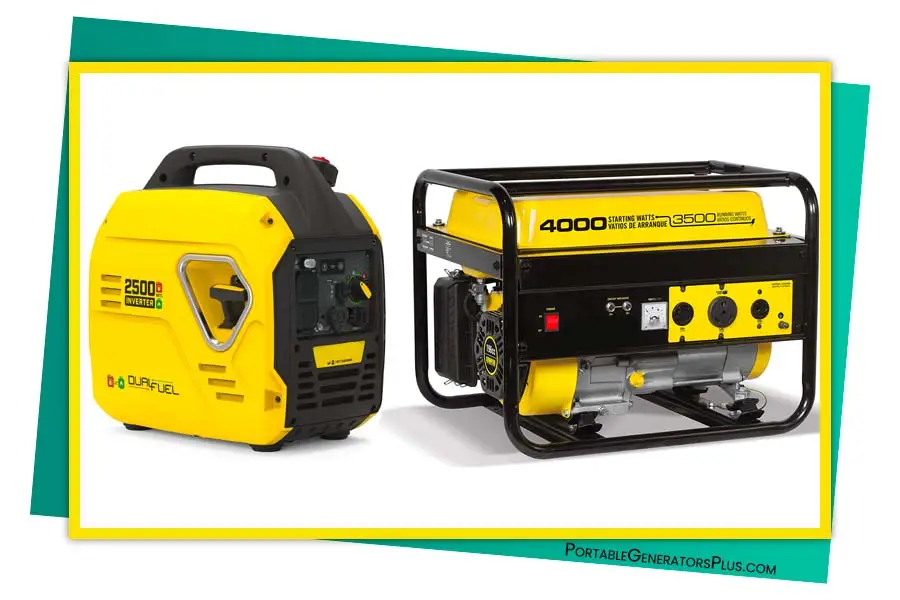
NOTE: We know the way the question “What Size Generator For RV?” is really poorly written, but it is the way the question is searched for. To show up as an answer in the SERP’s we have to quote the question as asked. Cheers.
Inverter Generators and Their Benefits
Inverter generators offer several advantages over conventional generators. They provide cleaner and more stable power, making them suitable for sensitive electronic devices. Inverter generators are also more fuel-efficient and can adjust their engine speed to match the required power load, resulting in quieter operation and improved fuel economy.
For more info on this, check out our article called ‘Inverter Generator Vs Generator: What’s The Difference?’
Choosing the right generator size for your RV is crucial for a comfortable and convenient experience on the road. Consider the power requirements of your appliances and systems, along with factors like fuel type, noise level, portability, and budget. By carefully assessing your needs and understanding the different generator sizes available, you can select the perfect generator to power your RV adventures.
Hope this was helpful, and thanks for reading.
Cheers!
More RV Generator Questions and Answers
How Many Watt Generator For RV?
Can I Start My Rv Generator Thru A Solar Controller?
How Long Do I Need To Run A Generator To Charge RV Batteries?
What Size Generator For 30 Amp RV?
Does RV Generator Charge House Batteries?
Will Generator Charge RV Battery?
How Much Gas a RV Generator Use?

